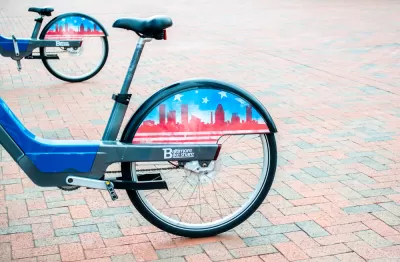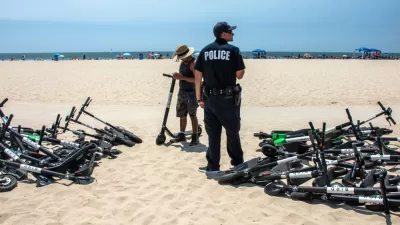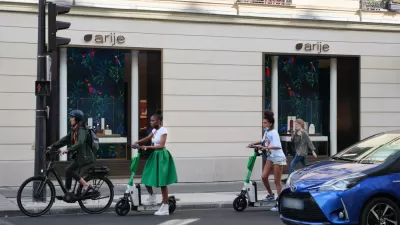Dockless electric scooters and bikes are welcome on the streets of Baltimore, as long as they follow a few rules. In related news, the municipal bike share system Baltimore Bike Share has ceased operations.

Two related bike and scooter share news developments in Baltimore could be a sign of things to come in the rapidly evolving landscape of personal transportation.
"Baltimore has shut down its problem-plagued bike share program after less than two years," report Colin Campbell and Talia Richman.
"The move, which [Mayor Catherine] Pugh announced at her weekly news conference, ends the city’s relationship with Bewegen Technologies, a Canadian firm, and Corps Logistics, its Westport-based maintenance subcontractor," according to the article.
The news about the demise of Baltimore Bike SHare came packaged with an announcement that the city would enter into a pilot program with dockless bike and scooter companies Bird and Lime. A press release from the city's Baltimore City Department of Transportation also chose to announce both news stories at the same time.
"Bird and Lime will each pay Baltimore $15,000, plus a dollar a day for each dockless scooter or bike they deploy, to operate a six-month pilot program in the city," reports Colin Campbell in an article that followed the original news.
"The pilot program, which runs through the end of February, allows each firm to maintain a fleet of no more than 1,000 dockless scooters and bikes," adds Campbell.
According to Matt Warfield, the planning department source quoted in the article, the pilot program was crafted with guidance from the National Association of City Transportation Officials (NACTO).
FULL STORY: Baltimore shuts down trouble-ridden Bike Share program in favor of dockless Bird, Lime options

Alabama: Trump Terminates Settlements for Black Communities Harmed By Raw Sewage
Trump deemed the landmark civil rights agreement “illegal DEI and environmental justice policy.”

Planetizen Federal Action Tracker
A weekly monitor of how Trump’s orders and actions are impacting planners and planning in America.

Why Should We Subsidize Public Transportation?
Many public transit agencies face financial stress due to rising costs, declining fare revenue, and declining subsidies. Transit advocates must provide a strong business case for increasing public transit funding.

Understanding Road Diets
An explainer from Momentum highlights the advantages of reducing vehicle lanes in favor of more bike, transit, and pedestrian infrastructure.

New California Law Regulates Warehouse Pollution
A new law tightens building and emissions regulations for large distribution warehouses to mitigate air pollution and traffic in surrounding communities.

Phoenix Announces Opening Date for Light Rail Extension
The South Central extension will connect South Phoenix to downtown and other major hubs starting on June 7.
Urban Design for Planners 1: Software Tools
This six-course series explores essential urban design concepts using open source software and equips planners with the tools they need to participate fully in the urban design process.
Planning for Universal Design
Learn the tools for implementing Universal Design in planning regulations.
Caltrans
Smith Gee Studio
Institute for Housing and Urban Development Studies (IHS)
City of Grandview
Harvard GSD Executive Education
Toledo-Lucas County Plan Commissions
Salt Lake City
NYU Wagner Graduate School of Public Service





























